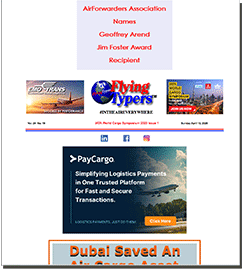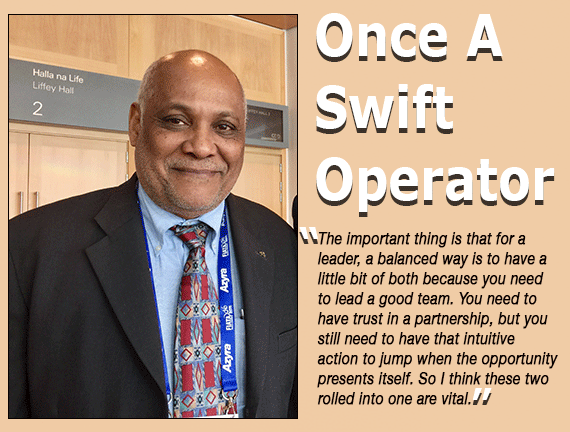 |
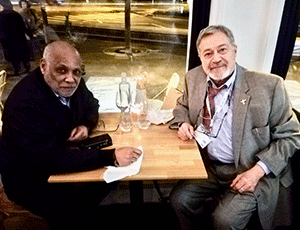 In my time spent in Geneva for the spring FIATA Headquarters, on an invitation extended by Geoffrey Arend I managed to dine with Issa Baluch, a person who will not fail to be recognized by those working in transport and logistics. Issa and I share the same age and parallel paths in life, in particular within FIATA. He served as FIATA President between 2003 and 2005, hence his involvement in the Presidency and Board of the association spanned a couple of decades at least. Issa is now an Honourable Member of the Board of FIATA, and in this capacity he came to Geneva this year. Issa is also active in academia, besides the industry. These are some of his recent positions: in 2020 Advisory Board Member, Calestous Juma Legacy Foundation; 2017/20 Member of the Dean's Council, Harvard Kennedy School; 2012 Senior Advanced Leadership Fellow - Harvard University; 2016/20 Chair Professor, college of Maritime Science and Management, NTOU Taiwan; 2023 Board Advisor, Aero Africa - South Africa/Greece; 2024 Board Advisor EVFLY-Singapore. In my time spent in Geneva for the spring FIATA Headquarters, on an invitation extended by Geoffrey Arend I managed to dine with Issa Baluch, a person who will not fail to be recognized by those working in transport and logistics. Issa and I share the same age and parallel paths in life, in particular within FIATA. He served as FIATA President between 2003 and 2005, hence his involvement in the Presidency and Board of the association spanned a couple of decades at least. Issa is now an Honourable Member of the Board of FIATA, and in this capacity he came to Geneva this year. Issa is also active in academia, besides the industry. These are some of his recent positions: in 2020 Advisory Board Member, Calestous Juma Legacy Foundation; 2017/20 Member of the Dean's Council, Harvard Kennedy School; 2012 Senior Advanced Leadership Fellow - Harvard University; 2016/20 Chair Professor, college of Maritime Science and Management, NTOU Taiwan; 2023 Board Advisor, Aero Africa - South Africa/Greece; 2024 Board Advisor EVFLY-Singapore.
My interview with this logistics celebrity is more intended to delve on the man’s character than his achievements in business: this latter one is the easier part, which everyone can find in any specialized publication. Here we go today: the Flying Typers offers you an exclusive, comprehensive interview with Issa Baluch, not something you get every other day.
FT: Issa, thanks for accepting to share your time with us. Talking of FIATA, we just finished the FIATA HQ with a new approach in meetings: breakout sessions and more engagement with the delegates. Do you like this approach, and results are positive or you have doubts?
IB: I think you would like to know my views, if the results are positive or if I have doubts about the new approach of the FIATA HQ Meeting. I think in a nutshell I can say that the meeting has been successful in delivering members’ expectations. They all seem to be content with the programming and with the agendas that were discussed. So, in that regard, I can say that FIATA managed to deliver more or less what was anticipated.
FT: What is really new in today’s FIATA compared to the FIATA of your presidency in the years 2000 . . . ? Today we talk about FBL, digitization, transport corridors and market pressure. The agendas look pretty similar. What is the difference?
IB: What is new in today's FIATA compared to the FIATA of my presidency . . . To tell you the truth, I cannot detect anything that is different other than one aspect: whether you refer to the FBL or the house waybill or any other documentation or requirement, what to me is not emphasized enough is the covenant of multi-modalism. I think, as far as the new generation is concerned, this is vital, because we need to focus on the five assets of logistics and these are sea, air, land, rail and inland waterways. A lot of times there is a combination of all of them together, to service a specific demand. I think we need to move away from single mode of transport to multi-modalism and I think this needs to be enhanced even more. That's the emphasis I would put on.
FT: You are considered an innovator within our industry; do you think that our sector has been in general ready to embrace innovation or is it missing opportunities? In the last twenty years have you seen freight forwarders’ commercial space expand or reduce?
IB: This is a very difficult question in the sense that innovation is sometimes in a blind spot. We don't see it with our naked eyes because there are things that are happening behind the curtain, so to speak. And what it does is that it leaves that room for everyone to see this in a transparent way. So there are opportunities that are lost, but this is an industry that does not look twenty years from today. They look more or less immediately. They want instant results: it's like a microwave approach! You want to press the button and get the results straight away. And so I don't see any losses because that's our mind-set and that is how things develop and I think we should be content with that as a result.
FT: In your personal contribution to this industry, do you consider your FIATA period or your academic tasks . . . which is more important? And which is more demanding from your point of view in terms of efforts and challenges?
IB: I look at myself as having lived two lives. I'm a Gemini, so by nature I have two personalities: very easy to explain. So one life dealt with one aspect, the second life dealt with the other. And I don't think there is any interconnectivity with both of them. I think one has to take each one in its stride.
FT: Talking of air cargo, where do you see the industry going? The traditional question is: more freighters or more belly hold? Probably it is not so clear cut, do you agree?
IB: And we see that very often coming up; and then in terms of peace and harmony, belly space becomes very precious. So I can't rule one for the other. I think both of them are equally crucial. And as we see more and more aircraft mobilized, everyone takes into account that belly space is so crucial, even if it delivers 16% of the total revenue of an airline, it is still very, very crucial, one that you cannot do without.
FT: Trade seems to retreat from globalization under political pressure, but globalization has been the engine behind forwarders’ success and has been made possible through logistics. Are tariffs the way to go, or are there greater risks in adopting this restrictive approach?
IB: I think this question really leads to one thing, and that is: is globalization right? Or is a protectionist approach the right way? My own view is: there is no right or wrong answer. Both have a time in life. Globalization had its own spotlight, and perhaps it has done its time. And maybe a little bit of a protectionist situation will answer the hour of the need. Maybe this is an open-end question, but always there are sentiments that drive these situations. And I think we are in a very, very precarious protectionist environment today.
FT: On a personal level, you live between UAE and the USA, where is home? If you were completely free to choose, with just one suitcase at hand and no strings attached, where would you prefer to live?
IB: I mean, not necessarily those two, but I can tell you, when I live in the U.S. for a period of about six weeks, I'm ready to move on to UAE. And when I'm in UAE for a period of six weeks, I'm ready to move somewhere else. I have this migration fever in me. And I think it is very difficult to anchor me in one spot. Well, it's mercury in your feet . . . So right now, I head back to the U.S., but I know for sure in four weeks’ time I'm heading back to UAE. And then beyond that period, I will be heading back to Africa. So I look forward to all that: that's the joy of my life to be able to swing from one place to another. Do I have a home? Maybe yes. And it could be in any of those continents.
FT: You are always showing a confident and reassuring smile. Were there times in your life when that smile was not so easy and natural? How did these times contribute to the man you are today, or nothing counts other than here and now?
IB: Absolutely, nothing counts! I try to maintain my very stable position, my very stable views, because I've seen enough in my lifetime. These rigmaroles of up down are very natural. And we can see one coming and moving us to the left. Another one coming and moving us to the right. And then another one coming, hallelujah, moving us to the middle. And I think that is life. So don't just . . .
Both: Here we are quoting the Time Warp in the Rocky Horror Show . . .
IB: One step to the left, one step to the right. Take it as it comes. And the most important thing, be content and be positive. So I'm not a pessimist. I always look at the brighter side.
FT: In your position many would have tried to build a family business involving children and other relatives. You did not seem to have done so, why? Is the family business model something of the past in your view?
IB: This is a very delicate question to me personally, because it's very painful. I have nine kids and I . . . No, I do not wish to avoid this question, I do not think so. My children, I offered them the opportunity to step in and I blew the whistle several times. I said, my friends, amigos, please pay attention: I'm preparing for the next generation to step in and take over the kingdom that I had built over 20 years: 26 countries, a very fine, comprehensive logistics company, dealing with multi-modal, because that's what I believed in. And I always felt that time will come when . . .
FT: That was the time of SWIFT, right?
IB: Yes, it was. I was telling them: time will come when you will sit before a customer and that customer wants you to offer air freight solutions, road solutions, maritime solutions, rail solutions, inland waterways solutions. You have to be a master of all. And that's what SWIFT represented. And the time came, in fact, that we now have e-commerce, which enhances all the modes of transport. But my kids were never interested . . . Now, you turn the clock after I sold the company. Years later, they learned about the company and they actually came back and they asked me, do you think we can get it back? And I said, my friend, time is gone. That was a meal we took many years ago. We've even forgotten. So, yes, that's one regret that they did not jump at the opportunity, and there we are.
FT: Maybe they were just too young . . .?
IB: They were too young and not that mature and there you are. But for me, it was the right time and the right thing.
FT: Last one, trust or intuition: which is more important to be successful?
IB: Well, to build a nice collaboration, to build a good team, to build a good partnership with overseas agents and whoever else, trust is very important. You have to trust your partners. You have to trust your team. Intuition, on the other hand, is very different because that is something that detects either the risks or the opportunities. Whether to jump, to go for that innovation, to go for that opportunity in terms of investments. So . . . to me, they are slightly different areas. But the important thing is that for a leader, a balanced way is to have a little bit of both because you need to lead a good team. You need to have trust in a partnership, but you still need to have that intuitive action to jump when the opportunity presents itself. So I think these two rolled into one are vital, and in my experience . . .
FT: True. But if it were the lady or the tiger, which door would you take?
IB: I must settle for a balanced one. There's no choosing one or the other, absolutely, for a leader, and I'm talking of leadership. Now I'm lecturing leadership. If I were a practicing freight forwarder, before I became an academia instrument, perhaps my answer would have been different. But today, my answer tells me you must have a balanced approach in both. It is not one or the other. And you are a solid, balanced leader if you have both, because in the end that is what delivers fantastic results. And when I review my own lifestyle and the things that I achieved in the past, I think I had both of them to lead my way into the progress.
FT: You certainly had both of them, my friend. So that's why I insisted on which one. We jumped a bit to the left and a bit to the right and in the end we cannot choose between the lady or the tiger, but such is life: being a leader as you have been all these years implies a lot of flexibility too, and that is plain to see.
Thank you, Issa. Thank you very much on behalf of our readers and, let me say this so freely, on behalf of many of our colleagues for the benefit and success that you have made possible in the industry. It was a great pleasure for me to spend the evening with you and a wonderful opportunity to catch up on our adjacent paths in this fascinating business. Thanks a million!
Marco Sorgetti
Editor's Note: Issa Baluch may know as much about logistics as anybody you will ever meet. During a long and illustrious career in logistics, he has won almost every award that has been given by any transportation publication or organization.
Issa is a heavy-weight dreamer and doer who takes nothing for granted, whilst working hard, sharing with others openly and freely, giving back to the industry and its people.
He possesses the chops and know-how gained over a career that spans 50-plus years, and he has used these things to gather some of his thoughts and put them down in black and white for all the rest of us to study and ponder.
The Baluch book “Transport Logistics - Past, Present and Predictions”, Amazon is a 300-page barn burner that Prof. Issa created in 2005, and it still fascinates.
Who else sets the table for modern logistics study with detailed examples of historical projects that demanded careful transport logistics management; for example, he explores what it took to build the Great Pyramid in Egypt, the transport logistics practiced in the Berlin Airlift, and the Battle of Stalingrad?
A second volume, “The Wheels of Commerce” Amazon was created in 2010 with Charles Edwards and follows the thread with another 340 pages on the topic.
Best known as the founder of Dubai-based Swift Freight, which was a medium sized multi-national that he eventually sold to Barloworld, one of Issa’s lasting contributions is that he is the guy that launched sea-air in Dubai. |
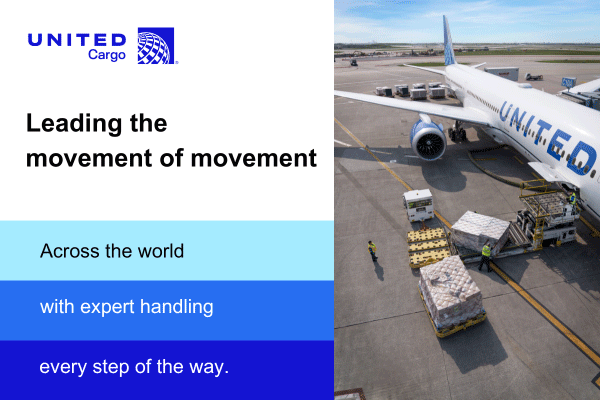



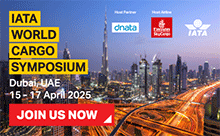

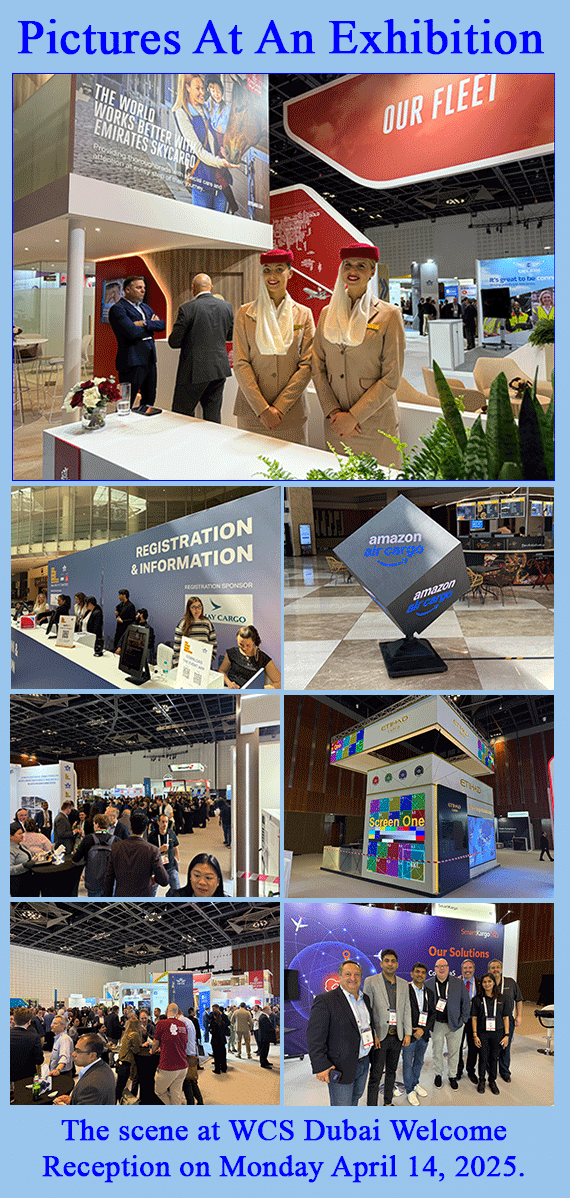
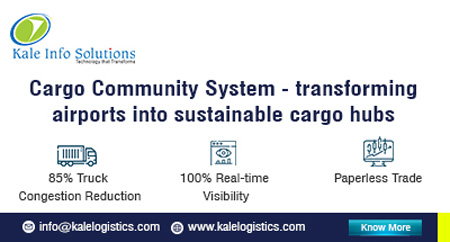
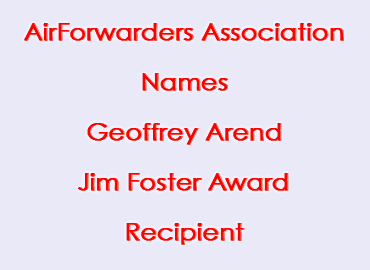

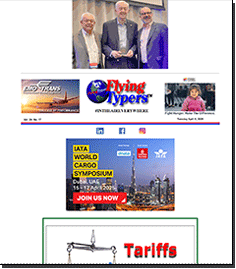 Vol. 24 No. 17
Vol. 24 No. 17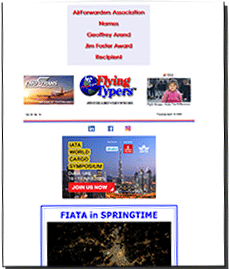 Vol. 24 No. 18
Vol. 24 No. 18